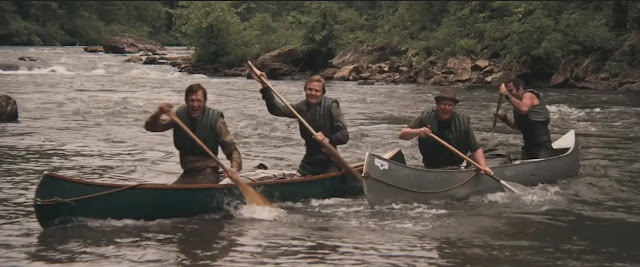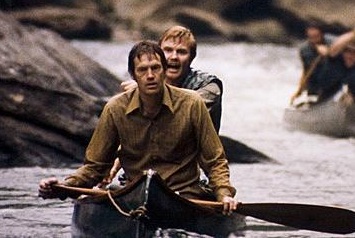I cannot imagine what the experience must have been like for someone watching Deliverance for the first time, knowing nothing about it. Even back in 1972, the shocking assault on Ned Beatty’s character, Bobby, was known thanks to John Dickey’s infamous debut novel of the same name. This novel, and the film based on it, entered the cultural zeitgeist, and long before I ever got around to seeing it for myself, I knew about that scene. Even being prepared for it, when the moment happens, the effect is not dampened by that foreknowledge. However, I cannot predict just how harsh that moment would be for someone who was not expecting it.
Going into the film cold, you might get the impression right away that this is a film about civilization intruding on nature. Right from the opening bit of dialogue, we are told that there is a dam being built and that is going to kill this big river. The four main protagonists are city boys who are looking to canoe down the river before it is gone forever, looking for a personal escape from their city lives. This theme is held up throughout the course of the film, closing out the picture with imagery of coffins being relocated, a church hoisted onto a truck and going down the road, and people having to move because of the shifting water this dam will create. All of this and more is for the sake of providing energy to fuel air conditioners and other conveniences for the city folks. Director/producer John Boorman also uses tricks like desaturation to remove some of the majesty of the flowing water and land, hiding the true beauty of the countryside.
There is a detachment between city folk and country folk. Whether this film originated the hillbilly horror genre or not is debatable. It certainly popularized the concept in a way that has lasted to the modern day. We see elements of it in everything from Tucker and Dale Vs Evil to Tiny Toon Adventures, and the tune “Fueding Banjos” has become synonymous with being alone in the wilderness. The opening scene takes place at a very rural gas station where the four leads, Lewis (Burt Reynolds), Ed (Jon Voight), Bobby (Ned Beatty), and Drew (Ronny Cox), have stopped to fuel up and find someone willing to drive their vehicles further down the river for them. Immediately, it is apparent that these four men have different points of view when it comes to the country people. Lewis and Bobby are rude and condescending to them, whereas Drew is far more kind and even shares a musical number with a local boy playing the banjo. Ed is more in the middle, where he will mostly keep himself on all things for the majority of the film.
Lewis is the most sure about everything in the group. He presents himself as an outdoorsman, willing and able to kill wildlife with his compound bow. We get the impression, early on, that he would be willing to kill a man with it should the opportunity arise. Indeed, when that opportunity does come along, he doesn’t hesitate. Lewis is the type of character that considers himself the outdoors type, able to provide for himself should society collapse. Perhaps he even secretly wants that to happen. He is the one that is spurring the other three on into this little adventure.
Ed, on the other hand, is less sure of himself. It’s telling that when he has an opportunity to shoot a deer with his bow, he is unable to do so. Taking a life, even for food or sport, is difficult for him, even though he thinks at first that he has it in him. Later, face to face with the barrel of a gun, he still struggles to make that shot, letting his arrow fly almost by accident. Ed is also the only one that we see a little into his private life, in an epilogue of sorts with his wife and son. For the most part, the back stories of these four men remain a mystery. All of it is in the pages of the novel but was wisely left out of the film.
Bobby is the odd man out of the bunch. He is not athletic in any way and doesn’t really seem to be friends with any of the other men, especially Lewis. Lewis call him chubby and other derogatory nicknames, and once they are on the water, he quickly refuses to share a canoe with him, making Ed switch places. Perhaps compensating for his physical limitations, Bobby talks down to the locals when they first meet them at the beginning of the film. Later, when he and Ed run into a couple of mountain men with rifles, it is Bobby that is sexually assaulted while Ed, tied to a tree, cannot look away. Lewis and Drew arrive just in time to see what has happened and, without hesitation, Lewis puts an arrow through one of the mountain men, killing him. The other man flees into the woods, surviving primarily because Ed is unable to shoot him as he flees.
Drew feels much more than the rest of his friends. He is the musician of the group, bringing his guitar with him on the trip even though they are going to be canoeing down the rough waters of a fast-moving river. When Lewis insists that they bury the mountain man and not report the killing lest they face a trial by a jury of the dead man’s friends, Drew is the one who adamantly does not want to go along with that plan. He is also the only one of the four men to die on the waters. How it happens is left up to interpretation. His friends think he was shot while they make their way down the river, but the noise of the water makes it impossible to tell if there was a shot fired. Drew was so despondent over the killing that he fails to put on his life jacket and, as they are traversing the rapids, he stands up and falls into the water. He may or may not have been shot at this point. He also may have just wanted to die rather than deal with the guilt of what they were all complicit in. When Ed traverses the hillsides and finds a man with a rifle, it may or may not be the second mountain man; that is left to interpretation, too.
Deliverance is the type of film that, even those who have not seen it generally know what it is about. When I mentioned it to a coworker who I know doesn’t see a whole lot of movies in general, let alone older movies, he knew what it was and had a strong opinion about the subject. For some people, homosexual rape is a topic that is a dealbreaker when it comes to their entertainment, even when it is just a brief scene in an otherwise straightforward thriller. Indeed, the subject was so taboo growing up that that was all I knew about this movie long before I ever saw it. Actor Ned Beatty would often get taunted in his day-to-day life by “fans” who would see him and shout out “squeal like a pig.” This was his first film, and he felt for years afterwards that he had literally been raped by it.
Ronny Cox was also being debuted in this film. It’s so odd seeing him playing such a sensitive and nice person after years of seeing his work in films like Robocop, Beverly Hills Cop, and Total Recall. He’s always seemed to have a hard edge to his characters, even when playing good guys, that it is nice to see that he can also play a genuinely nice person. He was cast primarily because he knew how to play the guitar, but he is so much more than that here, which makes his fate all the more heartbreaking.
None of the surviving characters escape this film unscathed. Lewis is seriously injured, Bobby endured the ultimate humiliation, and Ed is plagued with nightmares that wake him up in the middle of the night. These men set out to get away from the doldrums of city life, and it has forever changed them. This is not an experience you just get over. Each, in their own ways, is complicit in the murders, even Bobby, who doesn’t physically do any of the killings. He votes for burying the body of the first man rather than turning him in to the police. He also participates in the lies the three tell the police once they do finally get back to their cars.
This is a low-budget production that makes the most of its limited money. It infamously had little to no doubles for the actors, and no one was insured. This means that when we see canoes going over the rapids or capsizing, we can clearly see it is the actors in peril. There are so many stories of accidents on set, including Burt Reynolds breaking his tailbone. All of that contributes to the rawness and lack of polish that makes this the film that it is. This is a rough movie to watch at times, but it also has a lot to say about mankind’s rape of the environment for the sake of modern conveniences. It’s remembered mainly for the rape scene, but there is so much more to this film than just that. It’s also a taught thriller with some truly amazing set pieces and stunning scenery all around.
Academy Award Nominations:
Best Picture: John Boorman
Best Director: John Boorman
Best Film Editing: Tom Priestley
____________________________________________________
Release Date: July 30, 1972
Running Time: 109 minutes
Rated R
Starring: Jon Voight, Burt Reynolds, Ned Beatty, and Ronny Cox
Directed By: John Boorman










Comments
Post a Comment